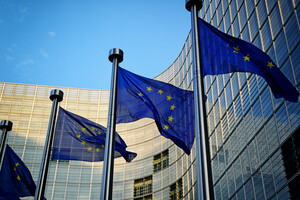Poland and the Baltic states insist on strengthening restrictions against Russia.

A potential new package of EU restrictions against The Russian Federation, which will be the eighth round of sanctions, has yet to be officially presented after meetings between European Commission officials and representatives of the bloc's states. It is expected to contain price caps on Russian oil, additional lists of sanctioned persons, as well as measures aimed at the Russian IT, cyber security and software industries, writes the FT.
Poland and the Baltic states are pushing for tough measures against Russia, including the exclusion of more Russian banks from the SWIFT network, a ban on diamond imports, and moves to target luxury goods and Russia's IT industry, cyber security and software – in response to new threats from Russian President Vladimir Putin.
However, officials said it would be difficult to find consensus among all 27 countries in the bloc, while Hungary has already said it does not want any new sanctions at all.
The main goal of the European Commission is to push through an agreement to cap the price of Russian oil after months of US-led negotiations.
The President of the European Commission, Ursula von der Leyen, said that new sanctions are necessary in response to Russia's decision to begin partial mobilization and annex parts of eastern Ukraine. But some officials believe it will be difficult to get anything more than a limited set of measures against the Russian Federation supported by all EU countries.
The EU's last attempt to pass a major sanctions package in May was met with public criticism and weeks of infighting, as some countries in the bloc, led by Hungary, refused to agree to an embargo on Russian oil until an exception was granted that would allow their refineries to continue importing.
According to local media reports, Hungarian Prime Minister Viktor Orbán said at a private meeting of his Fidesz party that the current EU sanctions against Russia should be lifted. Hungary's ruling party has said it plans “national consultations” on whether the country's citizens support EU sanctions.
Despite these domestic signs of resistance, diplomats in Brussels say Budapest has so far supported all rounds of sanctions against Moscow and that the eighth package of sanctions is likely to have far less impact on Hungary's economy than the oil embargo.
Those countries who are most convinced that the EU should increase pressure on Moscow, including Poland and the Baltic states, have circulated detailed measures they believe the European Commission should support. Among their ideas are a ban on diamond imports that would hit Belgium, excluding more Russian banks from the global SWIFT network, limiting the availability of IT and other services to Russia, and applying the same sanctions against Belarus, Moscow's ally in the war.
But EU officials played down the prospect of a deal on some of the more ambitious ideas, as some of the bloc's countries say existing sanctions will take longer to work. Their implementation requires the unanimous agreement of the EU.
“The more you invest, the more difficult it is for some EU member states to reach an agreement. The downside is that if it's too little, the hawks will say it doesn't go far enough,” said one EU diplomat.
Another diplomat noted that the oil price cap should remain the focus of the new round of sanctions, along with closing loopholes for Russia. economy,” he said.
“I don't know if we're going too far by announcing new sanctions without proper consultation,” one EU official responded to von der Leyen's comments, adding that reaching a consensus would difficult until the meeting of EU leaders in Prague in two weeks.
The aim is for EU ambassadors to discuss draft new sanctions next week, according to two people briefed on the talks, as Brussels tries to respond to Vladimir Putin's announcement of partial mobilization in Russia and new nuclear threats.
A spokesman for the European Commission said that EU foreign ministers “discussed the following possible restrictive measures that could be applied”, adding that negotiations on the sidelines of the UN General Assembly in New York “are ongoing”.
The new round of restrictions will focus on further sanctions against Russian individuals and entities, as well as possible additional export controls on “civilian products,” he added.
“This would be justified as Russia is moving towards a wartime economy”, – said a representative of the European Commission.
Read also: Putin's threats of mobilization: the EU hastily agrees on the “ceiling” of prices for oil – Bloomberg
It was previously reported that EU foreign ministers agreed to prepare new sanctions against Russia and increase arms supplies to Ukraine after Russian President Vladimir Putin announced partial mobilization in the country.
Related video < p>EU foreign policy chief Josep Borrell said Putin's statement, which included moves to annex Ukrainian territories and threaten to use nuclear weapons to “protect” Russia, showed the Kremlin's panic and desperation.
See sptm: Martial law: will the military be demobilized during the war This question worries many servicemen. The heads of foreign affairs of the G7 countries condemned the fake referendums of the Russian Federation and promised to continue the sanctions The ministers also emphasized that any annexation of the territory of Ukraine would be a gross violation of its sovereignty and the UN Charter . There is no such amount on one shelf somewhere – the Ministry of Defense answered the question about winter uniforms for the Armed Forces Nevertheless, winter clothes began to be supplied to Ukraine in the summer. Russia will be able to mobilize a third of officially planned reservists in a month – expert Everything that is happening now in the Russian Federation is mostly media noise, he added. In Kharkiv Oblast, the occupiers killed one civilian during the day, seven more people were injured – the head of the OVA Children are among the victims.




